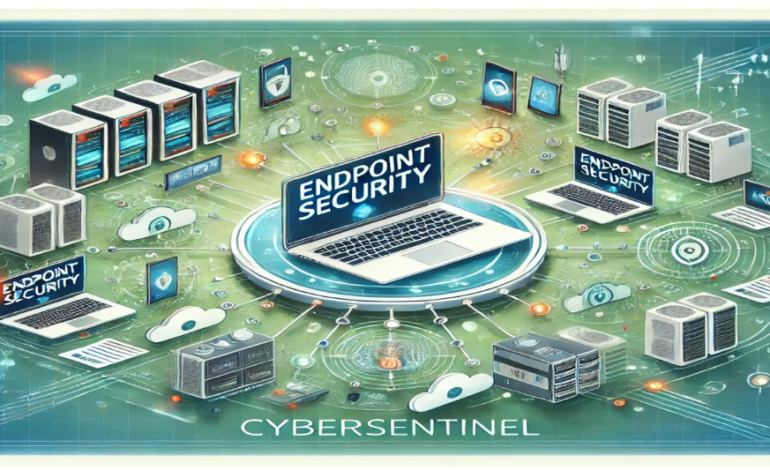How Endpoint Security Software Protects Your Business from Cyber Threats?

In recent years, the working environment has changed a lot. Working from home or a hybrid model of working from office or home has been introduced lately. But not all businesses have done enough to keep their employees safe. These changes have also changed how cyber criminals go after businesses and breach their security panels. To be safe from these new cyber threats, organizations have to take charge and enforce them. Multiple levels of security with the help of the best endpoint security software.
What Is Endpoint Security?
Endpoint security includes securing the devices like computers, servers, and other gadgets from harmful threats and cyber attacks. While cyber criminals have become more smart and advanced every business is more prone to multiple cyber threats. The devices connected to the company’s network are generally. The sensitive spots leveraging the hackers to break into the security systems. The malware majorly exploits the devices making it more prone to data theft.
To deal with this situation many organizations use the best endpoint security software to function. With the technology along with It teams to take care of these cyber threats effectively.
What Are the Components of Endpoint Security Software?
Endpoint security software maintains the data and information secure within the system. Earlier, firewalls were used to work within the business. Where the majority of the employees work in the same location using the same network. But as with a huge amount of the company’s strength, only a firewall is not enough. To lead the traffic through the main network making it a more risky and cyber attack prone place. A well functioning business needs both the network and endpoint security software. Whereas, network security helps in protecting the network by closing the open ports, controlling traffic, and detecting threats. On the other hand, endpoint security protects the single devices that are connected to the network. By emphasizing the use of the best endpoint security software organizations. Can safeguard their individual devices rather than the location of the employee.
There are certain key factors which help in choosing the right security solution depending on the requirements of the business.
- Number of employees: A centralized security solution is required in the companies. Where the number of employees are large to simplify the control. Small businesses can manage devices individually hence are not much interested in endpoint security software.
- Location of the employee: Many organizations have flexibility in their working style and allow. The employees to work at different locations such as home or the office itself. Hence, in such conditions, the company requires to make sure. That the device is connected to a secure network and their device is out of danger from any cyber threat.
- Device ownership: However, there are many cases where the employee is more comfortable while using his / her personal device and they connect to the company’s network. This also embarks certain risks levels of threats to the device.
- Data sensitivity: A basic antivirus software is not enough for the business handling the sensitive information and data. They need endpoint security software to protect against data loss and meet compliance needs, ensuring their data stays safe and secure.
How Endpoint Protection Works?
The main aim of endpoint security software is to protect the data and all the activities on devices connected to the company network. This process functions by checking files as they come in the device network and comparing them to a growing list of threats stored in the cloud. The endpoint security software provides the system admin access to install a central control panel on a network or server. This panel manages the security of all the devices such as computers, laptops, and smartphones connected to the network. The best endpoint security software updates itself when required, verifies logins, and enforces company policies as it is installed on each device of the company directly or remotely. It also prevents the employees from downloading or running unsafe or unauthorized apps and files through using encryption to protect data from being lost, while controlling all the applications that can be used.
Endpoint protection helps businesses quickly identify malware and other common threats and respond to it immediately. It also consists of features like endpoint monitoring, detection, and response to handle more complex threats, such as fileless malware, polymorphic attacks, and zero-day attacks.
When the endpoint security software detects something suspicious, it will try to restrict the malware from infecting the device. This could involve blocking the malware from running, quarantining the infected files, or even removing the malware completely. Many endpoint protection solutions also have a centralized management system that allows IT administrators to monitor and take control of the security of all the devices on the network from a single location.
Conclusion
Overall, endpoint security software plays a vital role in protecting businesses from the growing cyber threats in the modern, dynamic work environment. With the onset of remote and hybrid work models, companies can no longer rely individually on network-level security to safeguard their sensitive data and information. Endpoint security software provides a comprehensive solution that secures individual devices connected to the company network, regardless of their location. The major factors of effective endpoint security include real-time threat detection, prevention of malware infections, quick response to security threats, and centralized management. By implementing a strong and powerful endpoint security solution, organizations can ensure that their employees’ devices, whether company-owned or personal, are protected from the latest cyber threats, such as ransomware, zero-day attacks, and data breaches.
As the hi tech environment continues to grow, businesses must stay updated and invest in advanced endpoint security software to protect their operations, maintain compliance, and preserve the trust of their customers. By incorporating the capabilities of endpoint security software, companies can improve their overall cybersecurity posture and confidently navigate the challenges of the digital age.









